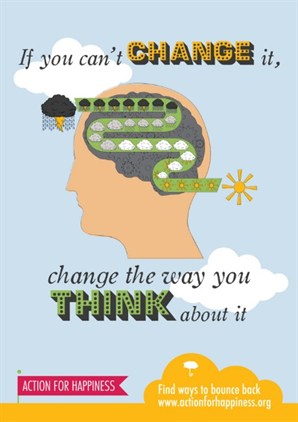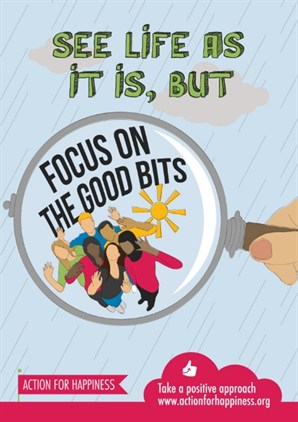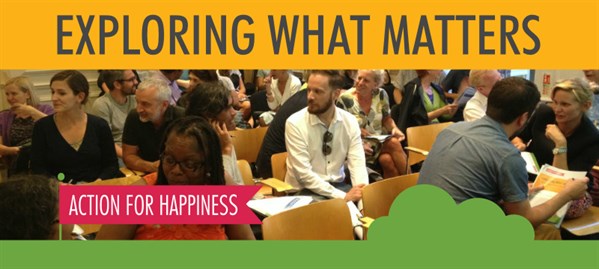Overcoming depression and anxiety
06 Jan 2015 | Lucy Roberts
Lucy Roberts discovered practical ways to help overcome her
depression and anxiety problems. Now she's working with Action for
Happiness to help others do the same...

I've had a long personal struggle with depression and anxiety.
I started working at Action for Happiness because it was the
only organisation I could find promoting the strategies I had
used to overcome my own problems.
So, I thought it might be helpful to write a short article
explaining some of the ways that our Ten Keys to Happier Living have helped me, in
the hope that this might help others too. This is just a personal
account. We are each individuals, and what helps one person might
not help the next.
Above all I suggest trying a range of creative approaches and
tailoring ideas to fit you personally, until you find a combination
that works. And don't give up. Depression is an illness with a
gradual recovery that can often strike more than once in our lives.
I often think it's just about perseverance and acknowledging every
little triumph, no matter how small, as big progress.
I also want to really underline that there is no shame in
depression and anxiety. It's just an illness like any other - and
people aren't ashamed of having cancer or diabetes. Rather, be
proud of your continued battle to overcome it.
I still have to put a lot of time in to maintaining feeling ok.
I go to therapy groups and have built a large support network which
I use regularly. And I try to still do all the things I've listed
below. I'm proud of my achievements.
Ten Keys for overcoming depression and
anxiety
I personally found focusing on depression could be depressing in
itself, which is why I much prefer to focus on happiness. I
love Positive Psychology as it looks at what
makes things go right, as opposed to what makes things go
wrong.
Most of the strategies I've used are covered in our Ten
Keys to Happier Living, which you can read more about in this free
guidebook. I'll now explain a bit about what I've done around
each key:
- GIVING (Do things for others). I've found it
really helpful to focus on other people and the world outside me as
much as possible. My 'self' is where my depression lives, so
I try to spend my 'mental time' elsewhere. Doing good for others
also activates the 'reward centres' in our brains which makes the
giver feel good too. I find giving presents feels better than
receiving them, don't you?
- RELATING (Connect with people). Having good
positive people around me, and connecting to new, good people has
probably had the single biggest impact on my depression. I've met
some great people through support groups and volunteering my free
time. Depression is a disease of isolation. I try to push
myself to avoid this.
- EXERCISING (Take care of your body). This can
be really hard when all you want to do is stay in bed, but it's
definitely worth it for the endorphins. Even a short walk to the
shop can help, especially if you chat to the shopkeeper when you
get there.
- APPRECIATING (Notice the world around). This
is about noticing what's going on around me and all the good things
about the world. A practice like Mindfulness really helps here. I
would recommend trying Headspace (which has a free 10-day
introductory program) or Mark Williams' 3-minute breathing space? Both are great places
to start.
- TRYING OUT (Keep learning new
things). Again this helps us enjoy the world around
us, and boost our confidence in all the different things we are
capable of doing and enjoying. It helped me get out of the
ruts I get stuck in, particularly when I realised that learning is
all about making mistakes, and these don't matter so long as you
try.


- DIRECTION (Have goals to look forward to).
Goals really help, but so does breaking them up in to small steps
so they are small and manageable. When I was really depressed
my one goal for the day would be to get out of the house at one
point and go to the shop to buy some milk or whatever. If I
accomplished this goal I felt I had accomplished something that
day.
- RESILIENCE (Find ways to bounce back). Did you
know that some people actually grow from traumatic experiences?
It's called "post traumatic growth" and depends on how the
person is wired to process stress. I worked on rewiring
myself here with some good CBT (Cognitive Behaviour Therapy), which
you should be able to access through your GP if you haven't
already. Also, not all therapies work for all people, and nor do
all therapists. If you don't find CBT helpful, try another type of
therapy (there are lots) and if you don't like your therapist, it
might be just a personality thing, so look in to finding a new one.
A prescription for anti-depressants can also be helpful, especially
in the short term, while you wait for the benefits of the other
strategies to kick in.
- EMOTION (Take a positive approach). Again CBT
works well here, as it helps us focus more on the positive, and
realise that many of the things we think are very negative really
aren't that important in the grand scheme. Another great way to
train your brain is to write a gratitude list of 3 good things that
happened each day before you go to bed, then read it again when you
wake up in the morning.
- ACCEPTANCE (Be comfortable with who you are).
I've found it really important to accept myself as I am, and stop
comparing myself to other people's "outsides" We all have our
own strengths, and I find it's important that I appreciate what I
do have to offer. If you wanted to discover what your
strengths are, you could find them by completing this VIA Strengths Survey, which I found really
helpful.
- MEANING (Be part of something bigger). I think
it's so important to find some meaning and purpose in life. I
asked myself the questions: "What do I believe in" (my answers were
things like kindness, honesty, love) "What do I have to offer the
world" (The strengths quiz helped with this, I found I am playful,
creative, and know a bit about overcoming depression) so then I
decided to be part of something bigger by using these skills in my
work. Of course it doesn't have to be your work, it can be a
hobby, or some quiet time taken alone to connect with the world at
large.... but I've found something in this area really helps me get
a sense of purpose and enjoyment out of being alive.
Also, here are a few books that I've found to be great for
helping overcome depression:

A final thing you could do is join one of our local Action
for Happiness Groups or Courses. This is the
strand of our work that I look after and I really believe in
them. If you want to join one of these, please email me at: lucy.roberts@actionforhappiness.org, and I can
tell you the group or course nearest to you.
Although our groups and courses are not
targeted specifically at people with depression and anxiety,
they are a great way to meet positive, likeminded people
locally and put in some action towards creating a happier
world, which can only make you feel good after all.
I really hope that helps. I know how difficult it is to do
anything when you're depressed. So maybe try one or two
of the ideas that look easier to start with. I really think
the trick is to keep trying as the benefits are cumulative and
build up over time.
Good luck in your journey,
Lucy

Lucy Roberts has been working with
Action for Happiness since December 2011. She looks after
our local groups and supports
people who want to run the Action for Happiness
course
